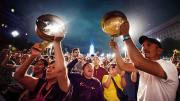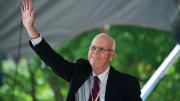“These shows are funny no matter your age or upbringing,” says Casey Lurtz ’07, who has just finished her term as president of the Harvard-Radcliffe Gilbert and Sullivan Players (HRG&SP). “Gilbert’s librettos are tightly packed with puns, word play, and jabs, and Sullivan’s scores are alternately humorous and haunting.”
A cumulative 5,000 Harvard undergraduates have been staging the nineteenth-century collaborations of Arthur Sullivan and W.S. Gilbert for 50 years now. In December, HRG&SP celebrated its golden anniversary with a double bill of Trial by Jury and H.M.S. Pinafore, a Victorian ball, cocktail receptions, talent shows, sing-alongs, and nostalgia exhibitions. “Harvard is the right venue, the right atmosphere, just the right place for Gilbert and Sullivan,” says Benjamin Morris ’09, who has acted in a show every semester of his Harvard career. “History and tradition are what Harvard stands for, and that’s what G&S is all about.”
HRG&SP is one of the most active and professional theater groups on campus, staging one operetta in the fall and another in the spring. Its casts and crews are crowded with 75 undergraduates plus a few alumni and community ringers, its budgets burgeon to more than $10,000 per show, and its productions rank among the best-attended on campus, with some 4,000 people thronging to the December run at the Agassiz Theatre.
 |
Carlton E. Forbes / Harvard Crimson |
Little Buttercup (Raquel Toledo ’10) invites sailors to buy her wares in HRG&SP’s recent run of H.M.S. Pinafore. |
In the half-century since the group’s founding, the repertoire has not changed one iota—the canon is still only 14 comic operettas. “I’ll be the first to admit the G&S program is pretty apparent after, well, the second show you see,” says Roy Kimmey ’09, who played Edwin in Trial by Jury. “The first act is full of unbelievable complications and the second act always ends in marriages.” Samantha Biegler ’08, the assistant curator and light operator for Pinafore, says, “What makes G&S so interesting is that each show contains similar elements, but they are used with originality and a sense of humor, so it really never gets old.” Charles Miller ’08, the group’s treasurer, adds, “Even though they’re so specific to their time, they’re still relevant now. Yes, we’re not in Victorian England, but these shows have all aged incredibly well.”
Some HRG&SP members arrive at Harvard already fans. “I grew up with G&S,” says Morris, the society’s historian during this reunion year. “My family would sit around the piano singing the songs, we saw the shows, and I would listen to the music over and over again.” He even remembers easing childhood fears with the operettas: “When I got scared, I would bundle up in bed and sing Pinafore to distract myself.” Other students find their way to HRG&SP through friends, or in their search for a home in Harvard’s competitive stage community. “Our theater culture is theater without all the drama,” says Miller, who joined HRG&SP only because he wanted the opportunity to produce a show at Harvard, but admits it has “become somewhat of an obsession.”
“People say they don’t know G&S, and then they hear five seconds of ‘Modern Major General’ and realize that’s how they learned the elements. If you’ve ever seen Animaniacs, Family Guy, or The Simpsons, you’ve probably already been exposed,” says Biegler. “I’m all for a Shakespeare club or a Sondheim club, since I adore both of them, but I feel like both genres are pretty well covered at Harvard. G&S needs a club. It’s like a consciousness-raising campaign.”
~Casey V. Cep





